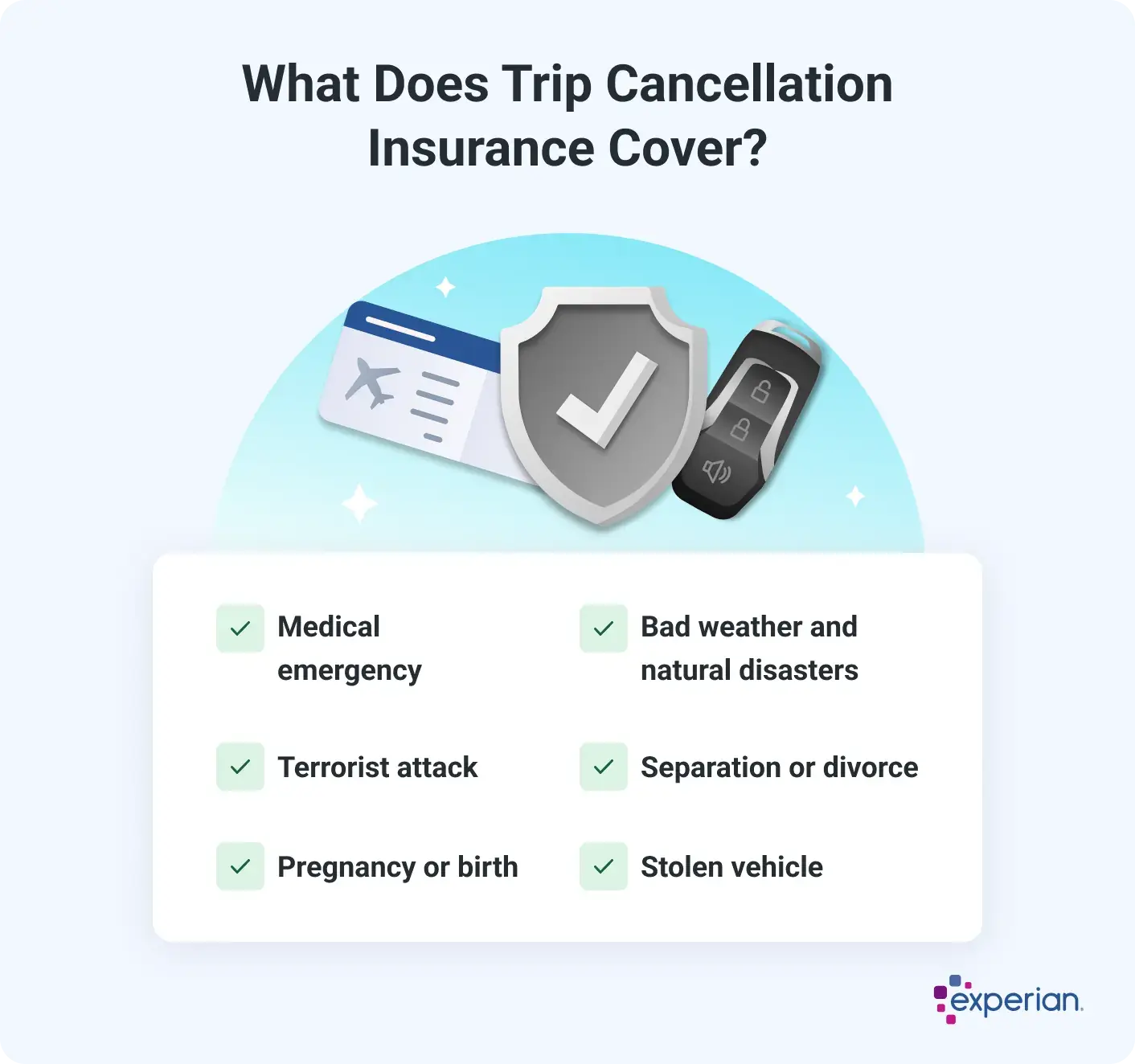What Is Trip Cancellation Insurance and How Does it Work?
Quick Answer
Trip cancellation insurance reimburses certain prepaid, nonrefundable travel expenses, such as airline tickets and hotel stays, if you cancel a trip due to unforeseen circumstances. Only cancellation reasons listed in your policy are covered.

So many things can prevent you from taking that Alaskan cruise or European getaway you've been looking forward to. Perhaps your uncle dies or you come down with an illness just before your trip. If you're forced to cancel your travels, trip cancellation insurance might protect you financially.
Read on to learn what trip cancellation insurance is, what the insurance does and does not cover, and how much trip cancellation insurance costs.
What Is Trip Cancellation Insurance?
Trip cancellation insurance reimburses certain prepaid, nonrefundable travel expenses, such as airline tickets and hotel stays, if you cancel your trip due to unforeseen circumstances. A trip cancellation insurance policy covers as much as 100% of your travel costs, as long as the policy includes the reason for the cancellation. Some reasons normally aren't covered by trip cancellation insurance, though.
Learn more: What Does Travel Insurance Cover?
What Does Trip Cancellation Insurance Cover?
Situations usually covered by trip cancellation insurance include:
- Medical emergency: This can include an unexpected illness or injury, as well as your death or the death of a travel companion or a family member who wasn't planning to accompany you.
- Bad weather and natural disasters: If severe weather hits your destination or your departure point, trip cancellation insurance typically kicks in. You're also normally covered if you're unable to stay at a hotel, resort or another place due to damage caused by severe weather or a natural disaster.
- Terrorist attack: Trip cancellation insurance can cover you if a terrorist attack happens at your U.S. or foreign destination within, say, 30 days of your scheduled arrival or within a certain radius of your destination. It also can cover an act of terrorism or a hijacking that occurs on an airplane or another mode of transportation.
- Separation or divorce: If you or a travel companion legally separates or divorces on or after the date your policy takes effect but before you're supposed to depart, the policy should offer trip cancellation benefits.
- Pregnancy or birth: If you find out you're pregnant after buying the policy or you need to be present for the birth of a relative's child, your travel cancellation benefits should apply to this scenario.
- Stolen or broken-down vehicle: If your or a traveling companion's vehicle is stolen or suffers a mechanical breakdown, you should be covered. This applies when a vehicle meant to take you to the departure point or be your main form of transportation on your trip is stolen, or when a mechanical breakdown happens on the way to your departure point.
- Job loss: This portion of a policy normally takes effect if you or a travel companion is fired or laid off by a current employer following the purchase of coverage.
- Military duty: When you, a traveling companion or a family member in the U.S. military is reassigned or the status of their personal leave changes, trip cancellation may reimburse certain travel expenses.
- Stolen passport or travel documents: When your or a travel companion's passport, visa or other travel documents required for the trip are stolen, your trip cancellation policy should cover you.
- Jury duty: If you're unexpectedly called for jury duty during a period you'd be on your trip, you should be able to take advantage of your cancellation benefits.
- Carrier's financial trouble: When a carrier such as a cruise line or airline halts operations due to financial issues, your policy likely will cover the situation.
Keep in mind that coverage varies from one issuer of travel cancellation insurance to another, so some of the cancellation reasons listed here might not be listed in your policy. It's important to check policy conditions carefully when choosing trip cancellation insurance.

What Does Trip Cancellation Insurance Not Cover?
Some common exclusions for trip cancellation insurance include:
- Lack of documentation: If you fail to provide documentation of your trip cancellation reason and related expenses, your policy likely won't offer coverage.
- Foreseeable events: If, for instance, you bought trip cancellation insurance after you found out a hurricane is heading toward your travel destination, you shouldn't expect your policy to provide coverage. That's true even if your policy lists a natural disaster as a covered reason.
- Preexisting condition: A preexisting medical condition normally is excluded from coverage unless you qualify for an exclusion waiver.
- Short flight delay: When your flight is delayed for just a few hours and you cancel your trip, your policy might not reimburse you for the airfare. But if the delay is lengthy—12 hours, for example—and is caused by a covered reason, you could be reimbursed if you cancel the trip.
- Rainy weather: It's supposed to rain every day of your trip to the beach, but no natural disaster has been forecast. You're out of luck when it comes to trip cancellation benefits.
- Missed flight: You show up to the airport after your flight has taken off, and you wind up canceling your trip. In this situation, travel cancellation insurance won't help you.
- Unsafe destination: You've heard about some political unrest at your destination, and you cancel your trip in the event that the unrest gets out of hand. Unless the U.S. State Department issues a high-level travel advisory for your destination, your travel costs likely won't be reimbursed.
- Unlisted reasons. If your reason for canceling a trip isn't mentioned in your policy, the insurer won't approve your claim for travel expenses.
What Is Cancel for Any Reason Travel Insurance?
A travel insurance policy's cancel for any reason (CFAR) benefit covers prepaid, nonrefundable travel costs if you must cancel a trip for a reason that's not listed in your policy. If you have this optional add-on coverage, you might be reimbursed for 50% to 75% of your travel expenses. These expenses typically include airfare, hotel stays, cruises, rental cars, event tickets and excursions.
Learn more: How Cancel for Any Reason (CFAR) Travel Insurance Works
How Much Is Trip Cancellation Insurance?
Some travel insurance plans offer trip cancellation coverage as an upgrade, while others might include trip cancellation as a standard feature. You might even be able to buy a standalone policy for trip cancellation.
Travel insurance, which often includes trip cancellation, generally costs 4% to 8% of the tab for your trip, according to the U.S. Travel Insurance Association. So, if you paid $7,000 for a cruise, airfare and hotel stays, that would equate to $280 to $560.
If you add cancel for any reason coverage to a travel insurance policy, the premium might go up by 40% to 50%.
Learn more: Average Cost of Travel Insurance
Is Trip Cancellation Insurance Worth It?
Many travelers find travel cancellation insurance worthwhile, particularly those with substantial prepaid, nonrefundable trip expenses or those who are worried about an unforeseen event that could cause them to cancel a trip. It also might be beneficial if you're taking a trip during hurricane season or winter weather.
Learn more: Should You Buy Travel Insurance?
How to Get Trip Cancellation Insurance
A number of insurers sell trip cancellation insurance, usually as one of the benefits included in a broader travel insurance policy. You typically can get quotes for travel insurance by visiting insurers' websites. Also, some credit card issuers provide trip cancellation as part of free travel insurance, but you might need to pay for your trip with their card to qualify for this perk.
How to File a Trip Cancellation Claim
While the process may differ from one insurer to another, here are the general steps for filing a trip cancellation insurance claim:
- Check your policy. Look over your policy to see whether it covers the reason you canceled your trip.
- Review the requirements. Before filing a trip cancellation claim, read the policy to make sure you meet the requirements. For example, you might need to notify an airline, a cruise line or another travel provider within a certain period after figuring out you need to cancel your trip.
- Submit your claim. You typically can submit a trip cancellation claim online or over the phone with your provider.
- Submit documentation. This documentation should indicate why you canceled your trip and how much money you're seeking to be reimbursed. Documentation includes receipts, itemized bills, invoices and unused tickets.
Frequently Asked Questions
The Bottom Line
Although trip cancellation insurance—as part of a broader travel insurance policy, as an add-on to your policy or as a stand-alone product—might set you back several hundred dollars, that could be a small price to pay if you end up canceling your travels. When you cancel your trip for a reason covered by your policy, you could recover up to 100% of your prepaid, nonrefundable travel costs. That's potentially thousands of dollars that'll go back in your pocket. Keep in mind, though, that trip cancellation insurance excludes a number of reasons for canceling a trip.
What’s on your credit report?
Stay up to date with your latest credit information—and get your FICO® Score for free.
Get your free reportNo credit card required
About the author
John Egan is a freelance writer, editor and content marketing strategist in Austin, Texas. His work has been published by outlets such as CreditCards.com, Bankrate, Credit Karma, LendingTree, PolicyGenius, HuffPost, National Real Estate Investor and Urban Land.
Read more from John